Daniel Seeberg: How to stop perceiving a smartphone as part of the body

In a brief digest in the footsteps of the first Idea Camp, we promised to tell you more about the speeches of our distinguished guests, Daniel Seeberg and Tim Olsen. Today we are starting to fulfill our promise and we are pleased to offer you a summary of the performance of Siberberg, a futurologist and an expert in the field of information technology, the author of the book Digital Diet.
Curriculum Vitae:

Daniel Sieberg, futurologist and information technology expert from the United States, author of Digital Diet . He currently holds the position of senior marketing manager and Google spokesperson. Daniel’s responsibilities include managing and overseeing Google’s branding strategy and media relations.
We invited Daniel to speak at Idea Camp because he is deeply and comprehensively studying the impact of gadgets (and smartphones in particular) on modern society. We believe that his experience and observation will help us, as gadget developers, to create more advanced devices and help our users to make communication with their electronic assistants more harmonious. We invite you to familiarize yourself with the record of his speech at Idea Camp.
')
I would like to talk with you about the impact of high technology on our lives. How we consume technology, and how technology consumes us. Before writing my book, I was a technical journalist. And I adored all my devices and gadgets, was constantly in search of new products. Constantly I only did that I chose a new phone or a replacement for any device in my house. My passion for this process was so strong that I stopped noticing the people closest to me. Honestly, it also ruined my marriage. After that, I had to reconsider my attitude to life.
The result of this revision was the book Digital Diet. Traveling around the world gave me invaluable information about how we are influenced by high technology. Watching people, I tried to find the right balance in using gadgets. We are becoming increasingly dependent on them, and manufacturers are creating a lot of additional products and accessories that only strengthen our gadget-dependence. All kinds of covers, holders for smartphones, stands, speakers, key rings and lots of everything else, for every taste, just to encourage us more often and longer to use the device.
By the way, let's do a little experiment. Surely your mobile phone is with you. Pass it now to anyone near you.
Why do you need it? So that you pay attention to your feelings at this moment. Alertness, fear, excitement. The reason for this is that most of us subconsciously perceive the phone as part of the body. How is it that I will now give my correspondence, contacts, personal data to someone ?! We have long formed a strong dependence on their smartphones. And many products contribute to this. For example, great news for everyone who likes to take a shower (this product was the result of a successful campaign on Kickstarter):
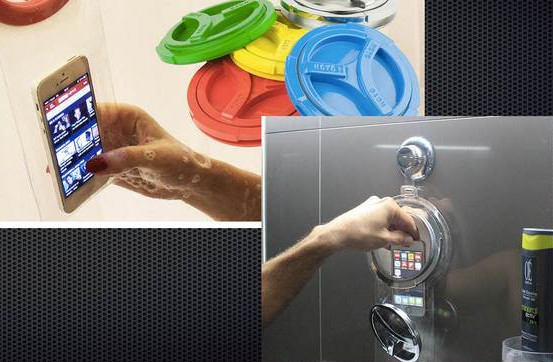
Now, even in the shower, you can never part with your favorite smartphone. The success of such products confirms the thesis that gadgets penetrate deeper into our lives.
Social connections
We are "hooked" on the constant search for information, on its continuous receipt. The Digital Diet book describes this neurobiological phenomenon of the sensation of the information flow directed at us , and various social networks and services play a special role in this. Our brain is constantly in a state of tension. And the following illustration shows on the example of the two coronations of the Popes, which great changes were made by technology in a very short period:
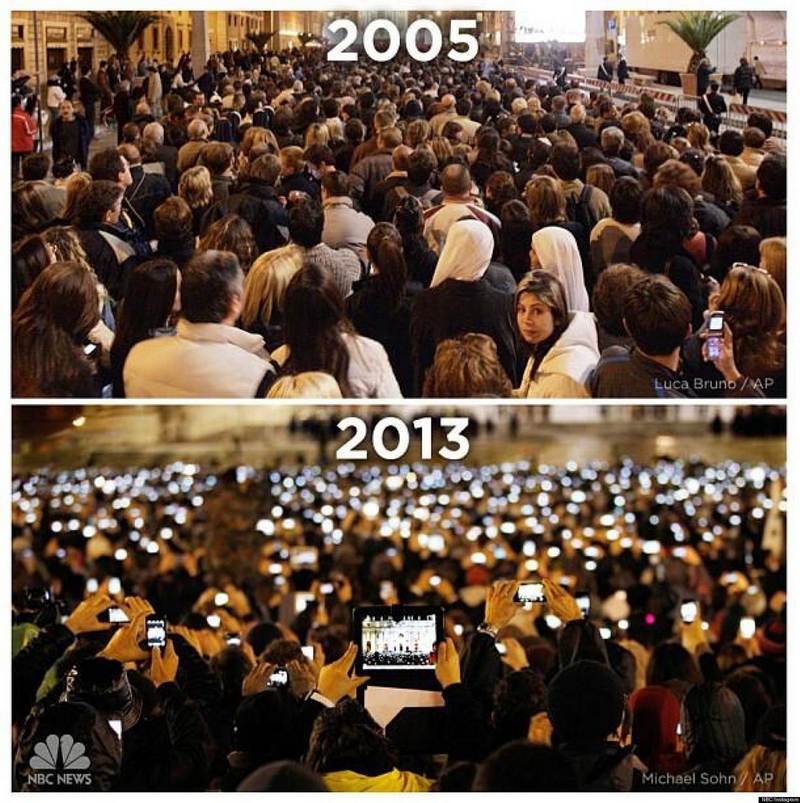
It would seem that there is bad? Take off people for memory. But this is only one of the sides of technological progress. Here is another example: friends gathered by the company in a cafe or on the street, while many have stumbled into smartphones. You will ask something, and in response: "Eh? .. what? .. yes, exactly ...". This situation is well known to all of us, isn’t it? With this behavior, we actually say that we are not worried about the people around us. We live in an age of total inattention to relatives and friends. But one of the most important conditions for strong social relations is to show participation, give others your attention and time.
Alas, the situation described has indeed become a cultural mainstream, which is already reflected even in advertising:

The slogan reads: “Disconnect. The Internet can take care of itself for a few minutes. ” This is a prime example of the problem that struck our society. Even when we meet with someone face to face in a comfortable environment, we often talk with a person while doing something in our smartphone. Many of us have not forgotten, but have never even known the art of conducting a conversation. This is really an art, and it is very much appreciated in business relations, whatever you do. After all, being interrupted by your gadgets during a conversation, you can miss important details, inadvertently hurt the interlocutor. Good conversation can often be a reliable basis for the formation of relationships.
Recently, a very interesting sociological survey was conducted among two age groups. Here are the results:
Is it permissible for you to be interrupted by an electronic message:
| Age | On a date | During the meal | During sex | In the toilet | I do not like being interrupted |
|---|---|---|---|---|---|
| Less than 25 years | 22% | 49% | eleven% | 24% | 33% |
| More than 25 years | eleven% | 27% | 6% | 12% | 62% |
Eloquently, isn't it? Pay attention to the attitude to the fact of interruption among people over 25 years old. But the most amazing thing is that 11% of respondents under 25 years old said that they would like to interrupt during sex! All this speaks of how strongly we have become psychologically dependent on our electronic gadgets, we have shifted the most important priorities.
In 2011, a survey was conducted among students at the University of Bournemouth, UK. 150 people at the beginning of the year spent a lot of time in social networks, the Internet and watching TV. At the same time, about 20% experienced a feeling of suffering and isolation. Some students kept the phone next to them all the time just to touch it .
A telephone for many has subconsciously become an extremely important and valuable thing. Here is a sketch from life: a young mother takes a stroller with a baby and speaks on the phone. Suddenly, the wheelchair overturns, the child falls out, but the mother does not let go of the hands of the phone, does not interrupt the call, and continues the conversation.


Who knows what this child’s mother’s attitude to his phone may have in the future for this child.
The influence of smartphones on our social connections is the higher, the more similar devices appear among the population. Below are the rates of increase in the number of smartphones in different countries. As you see, Russia occupies one of the leading positions:
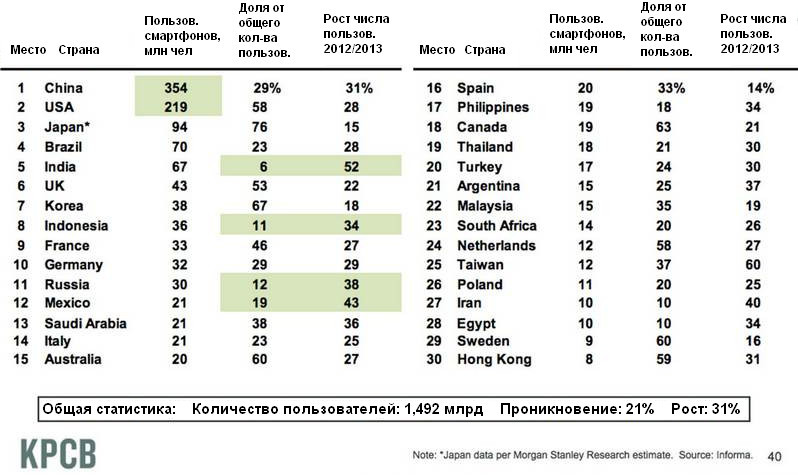
That is, the problem of psychological dependence on gadgets is really global, it covers the whole world, both developed and developing countries.
Not only smartphones absorb our attention and time. About 90% of the information we receive comes through all sorts of screens, and we mainly spend our time on 4 devices:
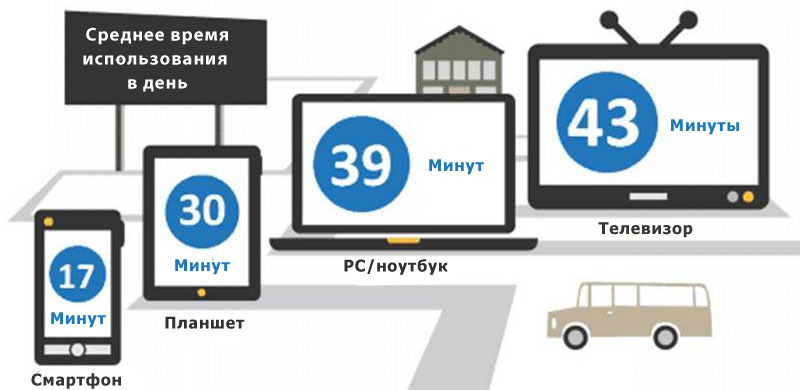
In this case, often we solve the same problem sequentially on different devices. For example, having found some information through a smartphone, we then continue to study it on using a laptop, because it has a larger screen. Or watch some kind of program on TV, simultaneously playing on the tablet. Or we find the necessary information on the road with the help of a desktop computer, and then we use it on a smartphone, there are many scripts.
What do we most often do when we use more than one device for the same?

At the same time, smartphones are most often the first initiating device in the chain of online "eaters" of time:
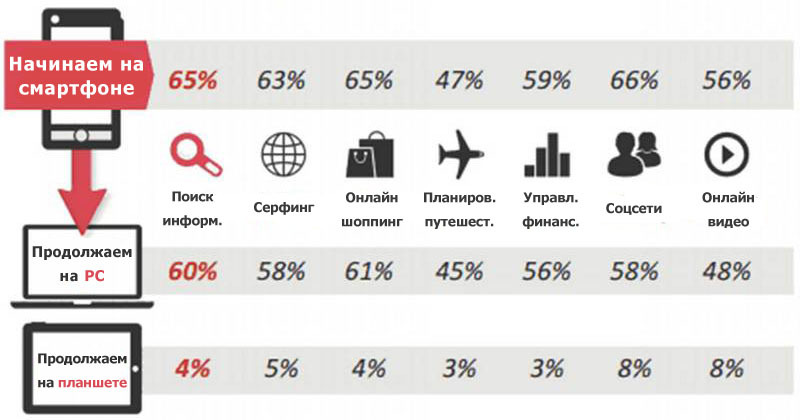
We start solving the most complex, complex tasks from desktops and laptops:
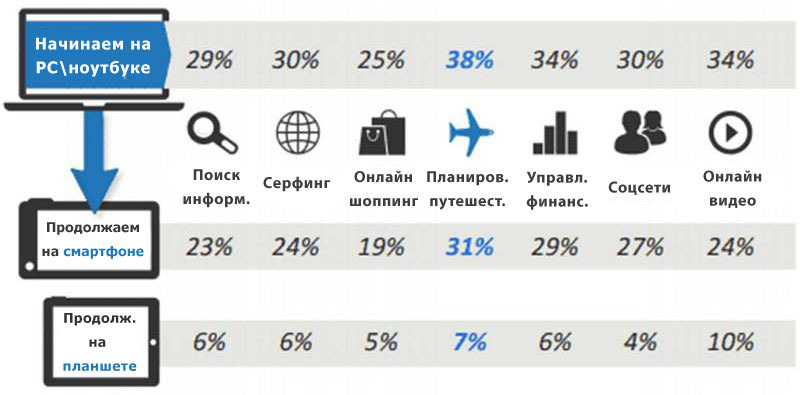
Multitasking
In addition to influencing social connections, smart and high-performance gadgets indirectly influence our professional activities. We now often do not just consume information. Thanks to the gadgets, we have become multi-tasking performers. At the same time, the quality of task performance is brought to the detriment of quantity. Our brain can fully process at the same time only 1-2 tasks. As a result, multitasking, so fashionable today, leads to deterioration in the quality of work and decrease in productivity. And this provokes the beginning of the reverse trend in many companies - a return to the single-tasking of employees. What a sin to conceal, many of us have long felt the irrelevance or even harm to gadgets in some cases. This is confirmed by the results of another sociological survey:
• 58% of smartphone users admitted that they hide them away when they “spend quality time” with family;
• 62% do the same when chatting with friends;
• 28% spent a lot of time on a smartphone during an important date;
• 35% pretend to do something in a smartphone to avoid talking to someone;
• 41% have ever preferred to search for the necessary information using a smartphone, rather than asking others.
Useful tips
How not to allow smartphones to interfere with our relationships, our communication with people? Here are some effective tips.
For example, you gathered with friends or colleagues in a cafe. Agree: let everyone put the smartphones in one pile at once, and whoever first gets his phone until the end of the meeting, pays the total bill.
If you have a business negotiation or meeting, then at the very beginning, invite all participants to abandon any devices while you communicate. Concentrate on what you are told and how, in response, try to communicate your thoughts without interference in the form of urgent calls or notifications.
And the third tip is probably the most important one: agree with your partner so that there will never be smartphones in your bedroom. Pay attention in bed to each other, not the phone.
By the way, there are a couple more arguments for refusing smartphones in the bedroom. Spending time on the gadget, we often do not get enough sleep. In the USA, due to a decrease in labor productivity due to a lack of sleep, losses amount to about $ 2,280 per year per person. In addition, the bluish light of smartphone screens can irritate our sleep receptors and disrupt the circadian rhythm, which leads to the same lack of sleep.
Agree, the tips are very simple. And believe me, they are really effective. It is only necessary to show willpower. If it is too difficult for you to distract yourself from your gadgets yourself, or you constantly forget about it, then install special reminder programs.
And the last tip, bonus track, so to speak: love modern technology. Only not unconditionally .
Thank!
Instead of conclusion
We asked Daniel to share his thoughts with the participants of the Idea Camp because, ideologically, we largely share his worldview: smartphones should not prevent us from living. Indeed, by design, they are designed to be an assistant, a tool that allows us to be more harmonious, calm and productive.
It's amazing how user scenarios change when there is no need to turn on the smartphone in order to check the “status” - whether there are no missed SMS, calls or messages in the IM chat.
After all, on YotaPhone there is a second screen, created by electronic ink technology, which always displays important information. There is no need to take the phone in hand, just look at it, lying nearby, and continue to work if there is nothing urgent.
It would seem such a small thing!
However, it was noted that as soon as a person takes the phone in his hands, just to check the status (or, even worse, to find out what time it is), there is a desire to “expand” this “status check” and look at the mail / facebook / look at the weather for tomorrow ... As a result, he finds himself an hour later, reading the post of an unfamiliar blogger about some completely empty life situation. Familiar?
We are trying to give YotaPhone such features that would make it not just more functional. We make it so as to allow our users to get more pleasure from life, unobtrusively making it more convenient, helping to spend less time on the routine. And, as it seems to us, we are on the right track. Why? About a month ago we decided to take part in the voting Smartphone Madness 2014 on the Laptomag website. It has not ended yet, but the current result already speaks for itself: YotaPhone advanced to the semifinals, beating such giants as the iPhone 5C and HTC One. Our rival is now the BlackBerry Z30, and we would appreciate your support in this contest.
Source: https://habr.com/ru/post/218537/
All Articles